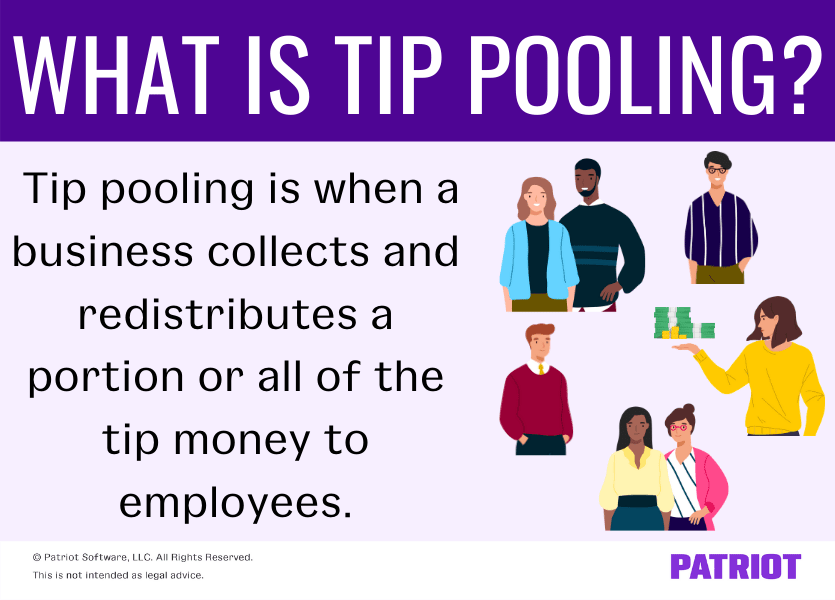In many types of service industries, employees can receive tips in addition to their regular wages. If your employees earn tips, you may consider giving tip pooling a try. Keep reading to learn all about tip pooling, including how it works and tip pooling laws you need to follow.
What is tip pooling?
So, how does tip pooling work? Tip pooling is when a business collects and redistributes a portion or all of the tip money to employees. Essentially, the business collects some or all of the tips from employees and puts them into one large “pool.” Then, the business divides the tips among the group of employees.
Generally, tip pooling is done among tipped employees. “Tipped employees” are workers who customarily and regularly receive more than $30 per month in tips.
Employers might divvy up tips based on hours worked, the number of customers served, or another predetermined way. Or, they may evenly split up the tips amongst the employees.
Tip pooling is most common in the hospitality industry, like at restaurants, hotels, bars, and coffee shops.
To make tip pooling work for your business, create a tip pooling policy for your employees. Your policy should detail:
- Whether the policy is mandatory or voluntary
- Which employees must participate (if mandatory)
- How much each employee must contribute
- How you will divide the tips
If you plan on implementing a tip pooling policy, have employees read over, sign, and date the tip pooling agreement form. Then, keep each employee’s signed form in your records.
Tip pooling vs. tip sharing
Many people use tip pooling and tip sharing interchangeably. However, they are not the same.
Tip sharing, also referred to as “tipping out,” involves pulling a certain amount or percentage of tips from tipped employees and distributing them among non-tipped employees. For example, at a restaurant, waiters and the kitchen staff may agree to do tip sharing. Even though the waiters are the ones making the tips, they share them with the non-tipped employees (e.g., cooks, dishwashers, hostesses, etc.).

Tip pooling laws
The Fair Labor Standards Act (FLSA) regulates tip pooling laws. And, some states and localities may set their own tip pooling rules. Check out more information about tip pooling laws below.
Federal
Again, the FLSA sets federal rules for pooling tips. As an employer, you need to know the Fair Labor Standards Act tip pooling rules if you plan on starting a pool at your business.
Under FLSA tip pooling, the employer, managers, and supervisors cannot be part of a tip pool, regardless of whether the employer takes a tip credit or pays employees the full minimum wage. And, employers cannot keep any funds from the tip pool.
The FLSA allows employers to take a tip credit toward the federal minimum wage. This means that you can pay your tipped employees a lower wage than the federal minimum (currently $7.25). The maximum tip credit you can claim is $5.12 per hour. The federal minimum cash wage for tipped employees is $2.13 per hour ($7.25 – $5.12). The tipped minimum wage can also vary by state.
Federal law allows employers to require employees to participate in a tip pool and share tips with other employees. However, not all businesses make tip pooling mandatory for their employees.
The FLSA also requires employers to notify tipped employees of any required tip pool contribution amount and the business’s tip pooling policy. Employers provide details to employees about how much each employee must contribute to the pool and how they plan on distributing tips.
2018 FLSA tip pooling amendment
In 2018, the FLSA was amended to clear up confusion about whether or not tipped employees need to share tips with untipped, or “back-of-the-house,” employees (i.e., tip sharing). For example, some employers would include all employees in a tip pool, which meant untipped workers, like dishwashers, would receive a portion of the tips.
Under the amendment, employers who do not take a tip credit may create a tip pool that includes back-of-the-house employees (e.g., cooks). However, if an employer takes a tip credit, they must limit the pool to employees who customarily and regularly receive tips (e.g., waiters).
The amendment also prohibited employers from keeping tips received by employees for any reason.
Recent FLSA tip pooling changes
In December 2020, the Department of Labor (DOL) issued its final ruling modifying federal regulations for tipped employees.
The final rule follows the 2018 federal legislation and its amendments and makes a few updates to tipped employee regulations. Under the DOL’s final rule:
- An employer can only control tips to:
- Distribute them to covered employees
- Require employees to share tips with other eligible employees
- Collect and redistribute employees’ tips to employees who participate in a tip pool
- Employers can create a nontraditional tip pool (i.e., tip sharing) that includes both tipped and untipped employees as long as the:
- Pool does not include any employers, managers, or supervisors AND
- Employer does not pay the tipped employees using a tip credit and pays them the full minimum wage instead
- An employer must identify—on their payroll or other records—each employee who receives tips and keep records of the amount of tips received by each employee
On October 28, 2021, the Department of Labor announced its Dual Jobs final rule that determines whether employers can take a tip credit for employees who perform tipped and non-tipped duties.
And since December 28, 2021, employers can only take a tip credit against a tipped employee’s wages for the time that employee performs tip-producing work. Tip-producing work includes work that:
- Produces tips
- Directly supports tip-producing work (if the work is not performed for a substantial amount of time)
Tip pooling and the tip credit: Potential changes
Although the tip credit is here for now, things could always change in the future. President Biden has expressed support for increasing minimum wage to $15 per hour and abolishing the tip credit.
Keep in mind that if legislation changes regarding minimum wage and the tip credit, there will more than likely be changes to tip pooling rules, too.
Stay tuned for updates on tip pooling and tip credit changes.
State and local
Each state and locality can also set its own tip pooling law. Check your state and local laws for tipped employees. If the state or city where you do business has laws that are more strict on tip pooling, you must follow your state or local laws (whichever is more generous).
Tip pooling pros and cons
Before you implement tip pooling at your business, consider the pros and cons.
Pros
You can use tip pooling as a tool to motivate your employees. It can function well in team-focused environments by encouraging everyone to work together and increase productivity.
Pooling can also give employees an increased sense of responsibility. With tip pooling, employees know their actions can directly impact the tip amount the team will receive.
Cons
Of course, tip pooling isn’t all sunshine and rainbows. And if done wrong, it can cause some workplace drama (which nobody wants).
Although tip pooling is designed to make the tipping process fair, it doesn’t always shake out that way. Some employees may take advantage of the pool and begin slacking. And, high-performing employees may wind up taking home fewer tips than they’re used to, which can result in some disgruntled workers.
Consider all of the disadvantages before you start a tip pooling policy at your business.
Looking for an easier way to run payroll for tipped, non-tipped employees, or both? With Patriot’s online payroll, you can add tips to each employee’s paycheck and withhold taxes with ease. Try it for free today!
This article is updated from its original publication date of April 25, 2016.
This is not intended as legal advice; for more information, please click here.



